The Great Gatsby Story 2022
VerifiedAdded on 2022/09/26
|6
|1678
|28
AI Summary
Here is the essay I need to write. I attached the documents. Any questions please ask. My biggest concern is to make sure this essay is not plagiarized and can be uploaded to Turnitin.com!!
Contribute Materials
Your contribution can guide someone’s learning journey. Share your
documents today.
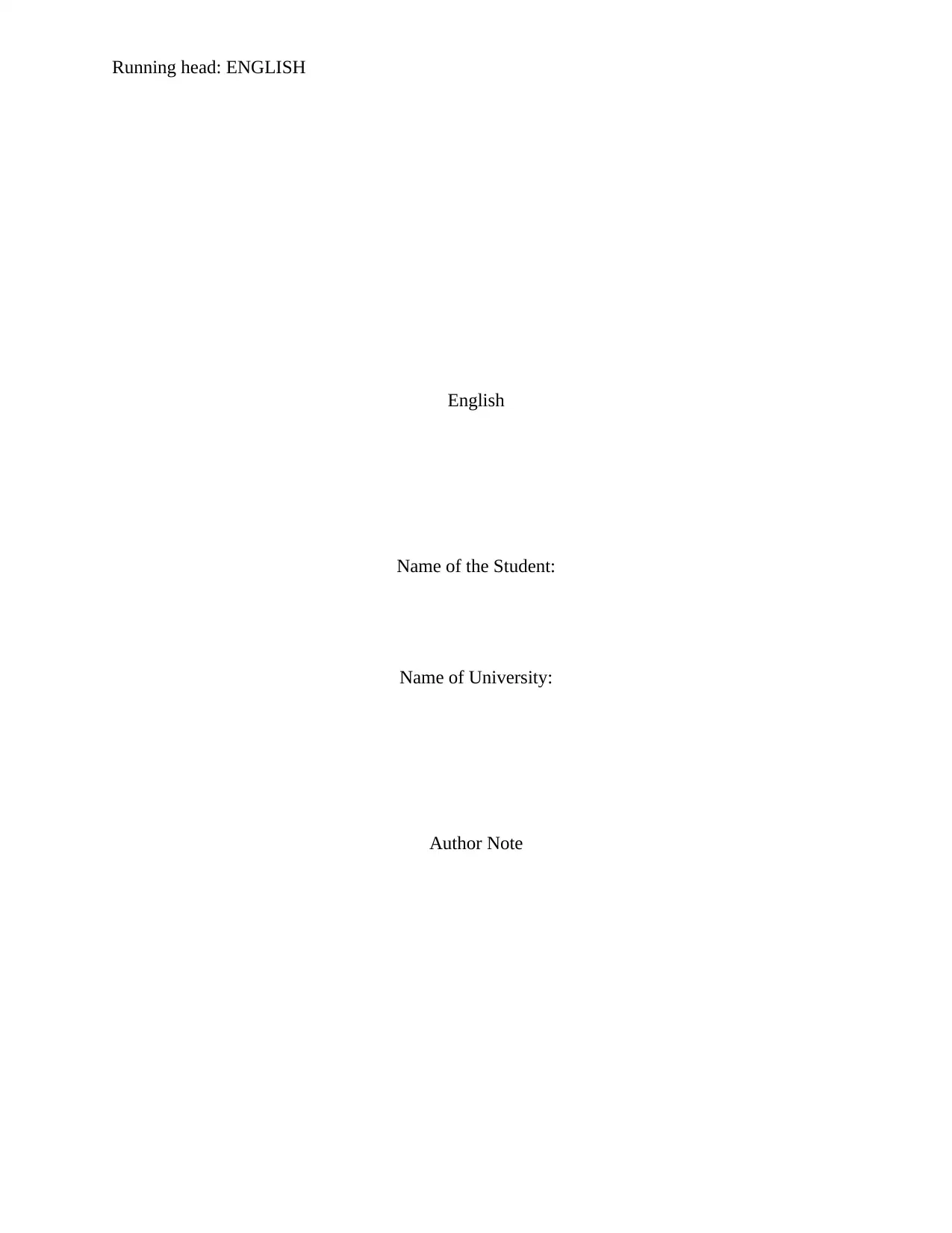
Running head: ENGLISH
English
Name of the Student:
Name of University:
Author Note
English
Name of the Student:
Name of University:
Author Note
Secure Best Marks with AI Grader
Need help grading? Try our AI Grader for instant feedback on your assignments.
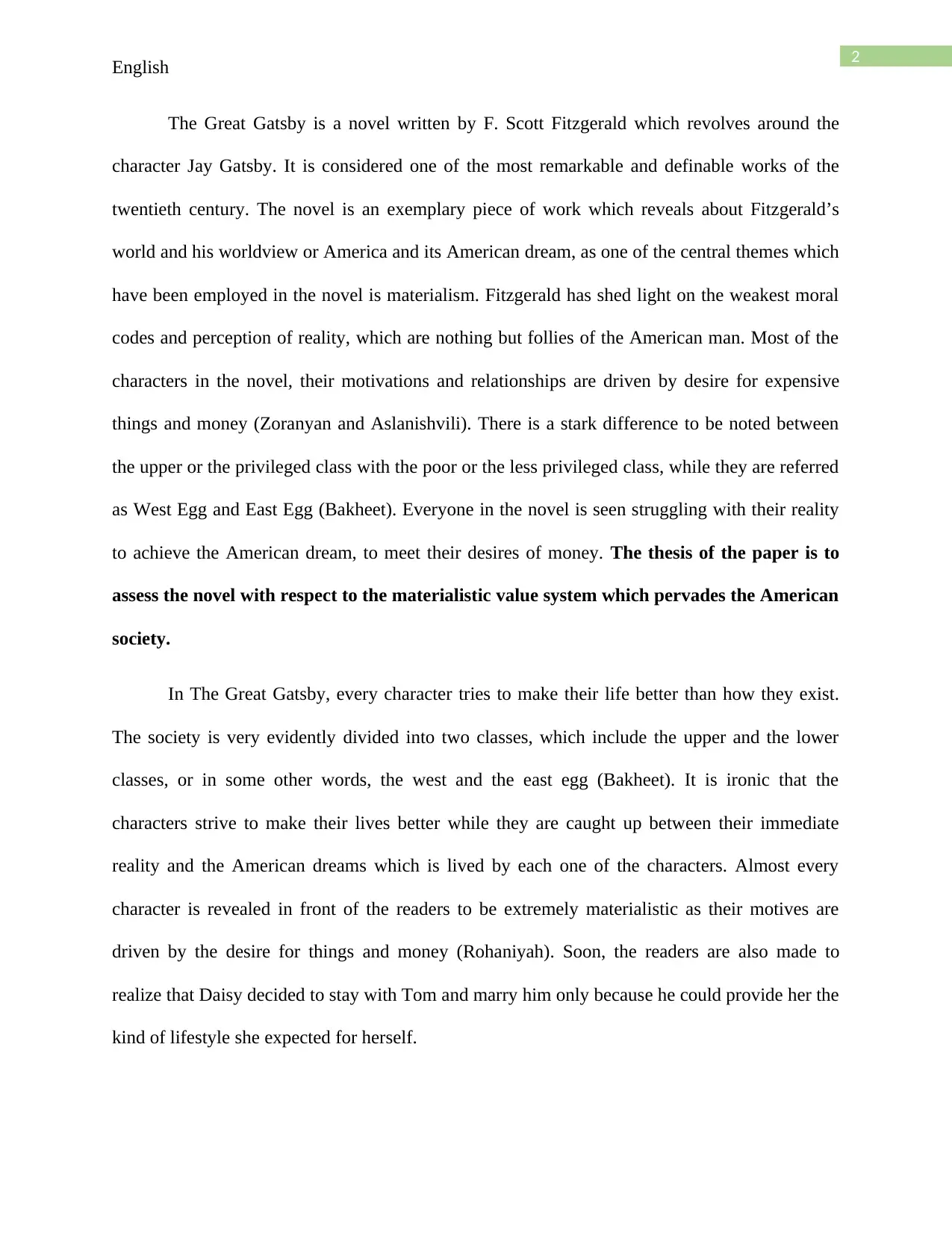
2
English
The Great Gatsby is a novel written by F. Scott Fitzgerald which revolves around the
character Jay Gatsby. It is considered one of the most remarkable and definable works of the
twentieth century. The novel is an exemplary piece of work which reveals about Fitzgerald’s
world and his worldview or America and its American dream, as one of the central themes which
have been employed in the novel is materialism. Fitzgerald has shed light on the weakest moral
codes and perception of reality, which are nothing but follies of the American man. Most of the
characters in the novel, their motivations and relationships are driven by desire for expensive
things and money (Zoranyan and Aslanishvili). There is a stark difference to be noted between
the upper or the privileged class with the poor or the less privileged class, while they are referred
as West Egg and East Egg (Bakheet). Everyone in the novel is seen struggling with their reality
to achieve the American dream, to meet their desires of money. The thesis of the paper is to
assess the novel with respect to the materialistic value system which pervades the American
society.
In The Great Gatsby, every character tries to make their life better than how they exist.
The society is very evidently divided into two classes, which include the upper and the lower
classes, or in some other words, the west and the east egg (Bakheet). It is ironic that the
characters strive to make their lives better while they are caught up between their immediate
reality and the American dreams which is lived by each one of the characters. Almost every
character is revealed in front of the readers to be extremely materialistic as their motives are
driven by the desire for things and money (Rohaniyah). Soon, the readers are also made to
realize that Daisy decided to stay with Tom and marry him only because he could provide her the
kind of lifestyle she expected for herself.
English
The Great Gatsby is a novel written by F. Scott Fitzgerald which revolves around the
character Jay Gatsby. It is considered one of the most remarkable and definable works of the
twentieth century. The novel is an exemplary piece of work which reveals about Fitzgerald’s
world and his worldview or America and its American dream, as one of the central themes which
have been employed in the novel is materialism. Fitzgerald has shed light on the weakest moral
codes and perception of reality, which are nothing but follies of the American man. Most of the
characters in the novel, their motivations and relationships are driven by desire for expensive
things and money (Zoranyan and Aslanishvili). There is a stark difference to be noted between
the upper or the privileged class with the poor or the less privileged class, while they are referred
as West Egg and East Egg (Bakheet). Everyone in the novel is seen struggling with their reality
to achieve the American dream, to meet their desires of money. The thesis of the paper is to
assess the novel with respect to the materialistic value system which pervades the American
society.
In The Great Gatsby, every character tries to make their life better than how they exist.
The society is very evidently divided into two classes, which include the upper and the lower
classes, or in some other words, the west and the east egg (Bakheet). It is ironic that the
characters strive to make their lives better while they are caught up between their immediate
reality and the American dreams which is lived by each one of the characters. Almost every
character is revealed in front of the readers to be extremely materialistic as their motives are
driven by the desire for things and money (Rohaniyah). Soon, the readers are also made to
realize that Daisy decided to stay with Tom and marry him only because he could provide her the
kind of lifestyle she expected for herself.
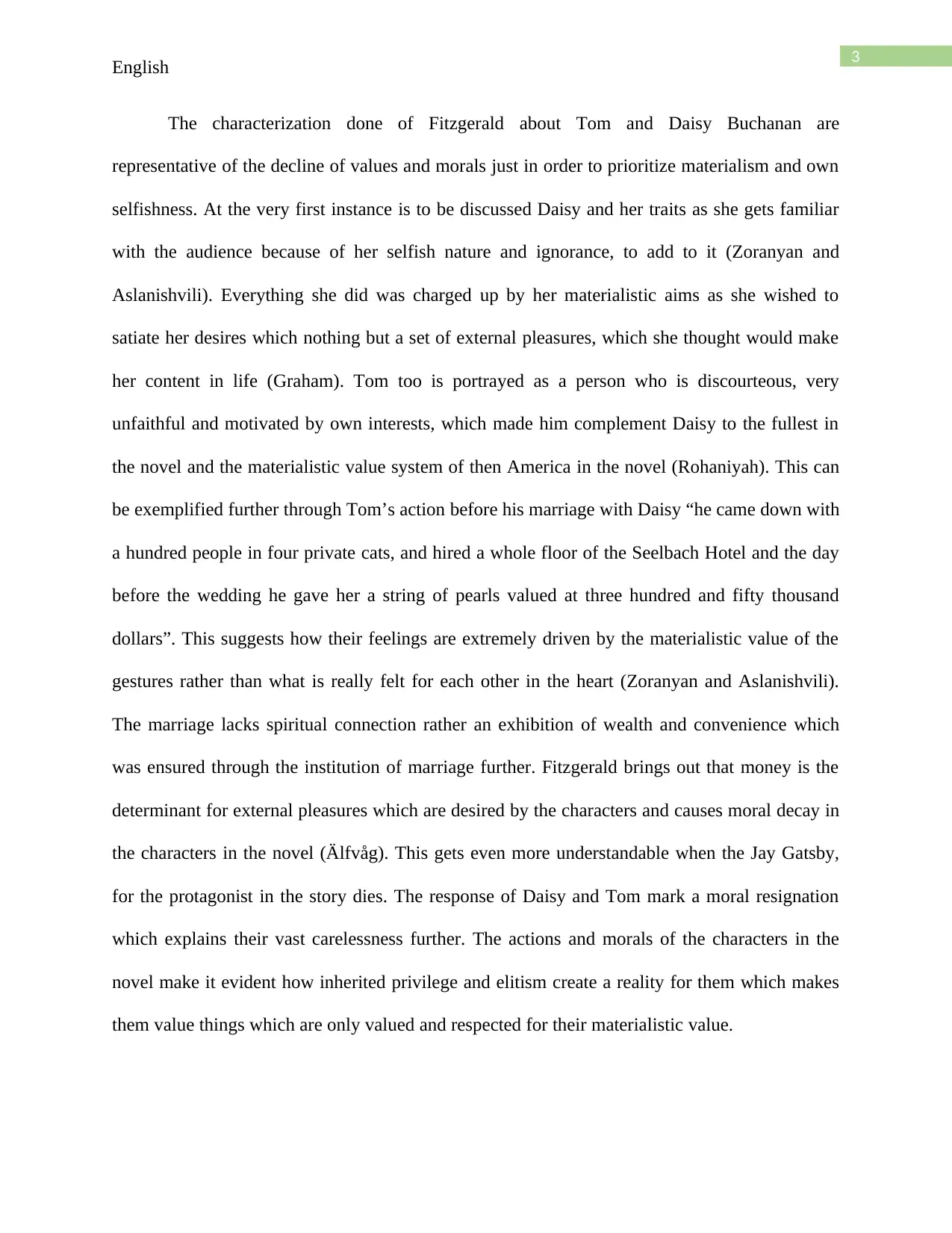
3
English
The characterization done of Fitzgerald about Tom and Daisy Buchanan are
representative of the decline of values and morals just in order to prioritize materialism and own
selfishness. At the very first instance is to be discussed Daisy and her traits as she gets familiar
with the audience because of her selfish nature and ignorance, to add to it (Zoranyan and
Aslanishvili). Everything she did was charged up by her materialistic aims as she wished to
satiate her desires which nothing but a set of external pleasures, which she thought would make
her content in life (Graham). Tom too is portrayed as a person who is discourteous, very
unfaithful and motivated by own interests, which made him complement Daisy to the fullest in
the novel and the materialistic value system of then America in the novel (Rohaniyah). This can
be exemplified further through Tom’s action before his marriage with Daisy “he came down with
a hundred people in four private cats, and hired a whole floor of the Seelbach Hotel and the day
before the wedding he gave her a string of pearls valued at three hundred and fifty thousand
dollars”. This suggests how their feelings are extremely driven by the materialistic value of the
gestures rather than what is really felt for each other in the heart (Zoranyan and Aslanishvili).
The marriage lacks spiritual connection rather an exhibition of wealth and convenience which
was ensured through the institution of marriage further. Fitzgerald brings out that money is the
determinant for external pleasures which are desired by the characters and causes moral decay in
the characters in the novel (Älfvåg). This gets even more understandable when the Jay Gatsby,
for the protagonist in the story dies. The response of Daisy and Tom mark a moral resignation
which explains their vast carelessness further. The actions and morals of the characters in the
novel make it evident how inherited privilege and elitism create a reality for them which makes
them value things which are only valued and respected for their materialistic value.
English
The characterization done of Fitzgerald about Tom and Daisy Buchanan are
representative of the decline of values and morals just in order to prioritize materialism and own
selfishness. At the very first instance is to be discussed Daisy and her traits as she gets familiar
with the audience because of her selfish nature and ignorance, to add to it (Zoranyan and
Aslanishvili). Everything she did was charged up by her materialistic aims as she wished to
satiate her desires which nothing but a set of external pleasures, which she thought would make
her content in life (Graham). Tom too is portrayed as a person who is discourteous, very
unfaithful and motivated by own interests, which made him complement Daisy to the fullest in
the novel and the materialistic value system of then America in the novel (Rohaniyah). This can
be exemplified further through Tom’s action before his marriage with Daisy “he came down with
a hundred people in four private cats, and hired a whole floor of the Seelbach Hotel and the day
before the wedding he gave her a string of pearls valued at three hundred and fifty thousand
dollars”. This suggests how their feelings are extremely driven by the materialistic value of the
gestures rather than what is really felt for each other in the heart (Zoranyan and Aslanishvili).
The marriage lacks spiritual connection rather an exhibition of wealth and convenience which
was ensured through the institution of marriage further. Fitzgerald brings out that money is the
determinant for external pleasures which are desired by the characters and causes moral decay in
the characters in the novel (Älfvåg). This gets even more understandable when the Jay Gatsby,
for the protagonist in the story dies. The response of Daisy and Tom mark a moral resignation
which explains their vast carelessness further. The actions and morals of the characters in the
novel make it evident how inherited privilege and elitism create a reality for them which makes
them value things which are only valued and respected for their materialistic value.
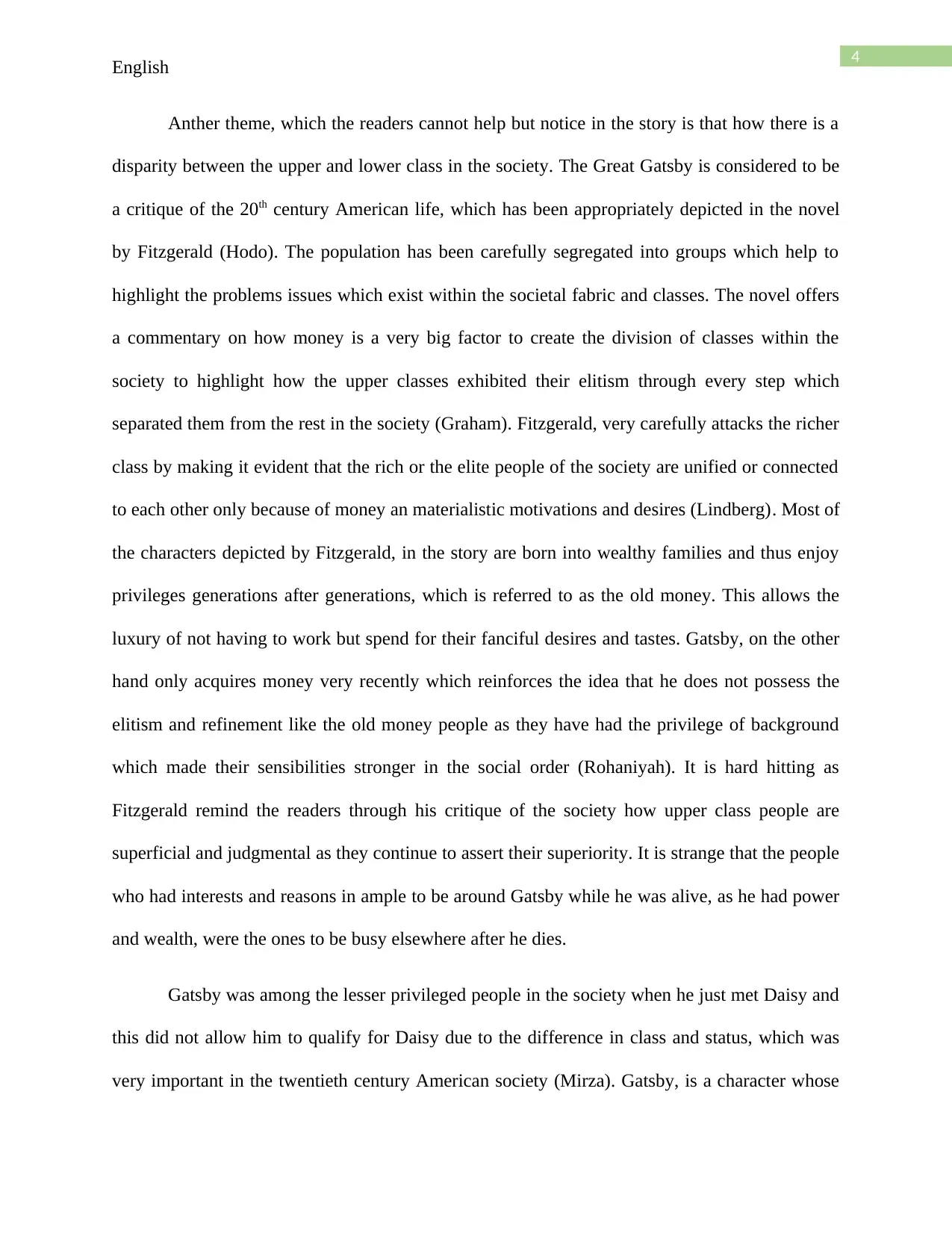
4
English
Anther theme, which the readers cannot help but notice in the story is that how there is a
disparity between the upper and lower class in the society. The Great Gatsby is considered to be
a critique of the 20th century American life, which has been appropriately depicted in the novel
by Fitzgerald (Hodo). The population has been carefully segregated into groups which help to
highlight the problems issues which exist within the societal fabric and classes. The novel offers
a commentary on how money is a very big factor to create the division of classes within the
society to highlight how the upper classes exhibited their elitism through every step which
separated them from the rest in the society (Graham). Fitzgerald, very carefully attacks the richer
class by making it evident that the rich or the elite people of the society are unified or connected
to each other only because of money an materialistic motivations and desires (Lindberg). Most of
the characters depicted by Fitzgerald, in the story are born into wealthy families and thus enjoy
privileges generations after generations, which is referred to as the old money. This allows the
luxury of not having to work but spend for their fanciful desires and tastes. Gatsby, on the other
hand only acquires money very recently which reinforces the idea that he does not possess the
elitism and refinement like the old money people as they have had the privilege of background
which made their sensibilities stronger in the social order (Rohaniyah). It is hard hitting as
Fitzgerald remind the readers through his critique of the society how upper class people are
superficial and judgmental as they continue to assert their superiority. It is strange that the people
who had interests and reasons in ample to be around Gatsby while he was alive, as he had power
and wealth, were the ones to be busy elsewhere after he dies.
Gatsby was among the lesser privileged people in the society when he just met Daisy and
this did not allow him to qualify for Daisy due to the difference in class and status, which was
very important in the twentieth century American society (Mirza). Gatsby, is a character whose
English
Anther theme, which the readers cannot help but notice in the story is that how there is a
disparity between the upper and lower class in the society. The Great Gatsby is considered to be
a critique of the 20th century American life, which has been appropriately depicted in the novel
by Fitzgerald (Hodo). The population has been carefully segregated into groups which help to
highlight the problems issues which exist within the societal fabric and classes. The novel offers
a commentary on how money is a very big factor to create the division of classes within the
society to highlight how the upper classes exhibited their elitism through every step which
separated them from the rest in the society (Graham). Fitzgerald, very carefully attacks the richer
class by making it evident that the rich or the elite people of the society are unified or connected
to each other only because of money an materialistic motivations and desires (Lindberg). Most of
the characters depicted by Fitzgerald, in the story are born into wealthy families and thus enjoy
privileges generations after generations, which is referred to as the old money. This allows the
luxury of not having to work but spend for their fanciful desires and tastes. Gatsby, on the other
hand only acquires money very recently which reinforces the idea that he does not possess the
elitism and refinement like the old money people as they have had the privilege of background
which made their sensibilities stronger in the social order (Rohaniyah). It is hard hitting as
Fitzgerald remind the readers through his critique of the society how upper class people are
superficial and judgmental as they continue to assert their superiority. It is strange that the people
who had interests and reasons in ample to be around Gatsby while he was alive, as he had power
and wealth, were the ones to be busy elsewhere after he dies.
Gatsby was among the lesser privileged people in the society when he just met Daisy and
this did not allow him to qualify for Daisy due to the difference in class and status, which was
very important in the twentieth century American society (Mirza). Gatsby, is a character whose
Secure Best Marks with AI Grader
Need help grading? Try our AI Grader for instant feedback on your assignments.
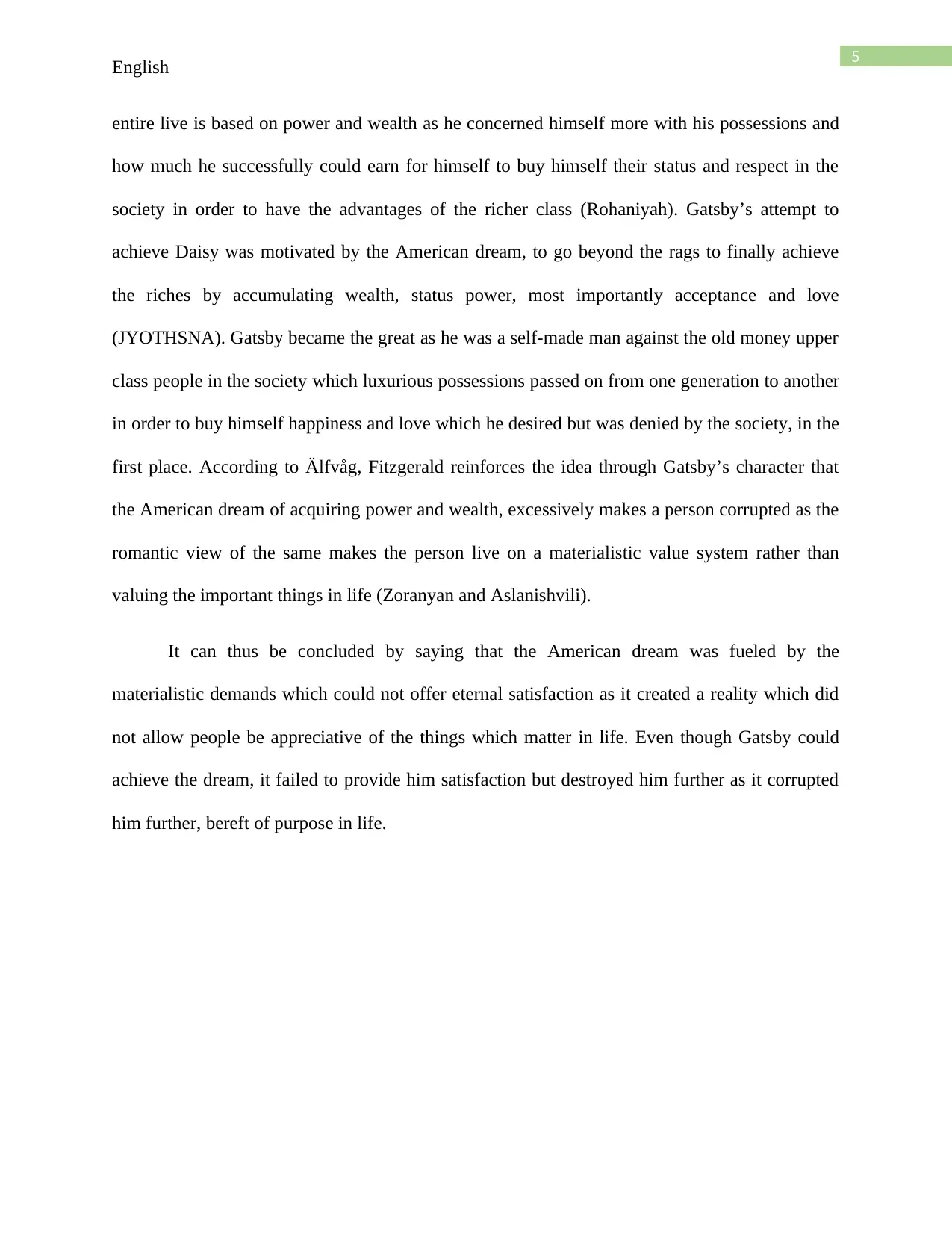
5
English
entire live is based on power and wealth as he concerned himself more with his possessions and
how much he successfully could earn for himself to buy himself their status and respect in the
society in order to have the advantages of the richer class (Rohaniyah). Gatsby’s attempt to
achieve Daisy was motivated by the American dream, to go beyond the rags to finally achieve
the riches by accumulating wealth, status power, most importantly acceptance and love
(JYOTHSNA). Gatsby became the great as he was a self-made man against the old money upper
class people in the society which luxurious possessions passed on from one generation to another
in order to buy himself happiness and love which he desired but was denied by the society, in the
first place. According to Älfvåg, Fitzgerald reinforces the idea through Gatsby’s character that
the American dream of acquiring power and wealth, excessively makes a person corrupted as the
romantic view of the same makes the person live on a materialistic value system rather than
valuing the important things in life (Zoranyan and Aslanishvili).
It can thus be concluded by saying that the American dream was fueled by the
materialistic demands which could not offer eternal satisfaction as it created a reality which did
not allow people be appreciative of the things which matter in life. Even though Gatsby could
achieve the dream, it failed to provide him satisfaction but destroyed him further as it corrupted
him further, bereft of purpose in life.
English
entire live is based on power and wealth as he concerned himself more with his possessions and
how much he successfully could earn for himself to buy himself their status and respect in the
society in order to have the advantages of the richer class (Rohaniyah). Gatsby’s attempt to
achieve Daisy was motivated by the American dream, to go beyond the rags to finally achieve
the riches by accumulating wealth, status power, most importantly acceptance and love
(JYOTHSNA). Gatsby became the great as he was a self-made man against the old money upper
class people in the society which luxurious possessions passed on from one generation to another
in order to buy himself happiness and love which he desired but was denied by the society, in the
first place. According to Älfvåg, Fitzgerald reinforces the idea through Gatsby’s character that
the American dream of acquiring power and wealth, excessively makes a person corrupted as the
romantic view of the same makes the person live on a materialistic value system rather than
valuing the important things in life (Zoranyan and Aslanishvili).
It can thus be concluded by saying that the American dream was fueled by the
materialistic demands which could not offer eternal satisfaction as it created a reality which did
not allow people be appreciative of the things which matter in life. Even though Gatsby could
achieve the dream, it failed to provide him satisfaction but destroyed him further as it corrupted
him further, bereft of purpose in life.
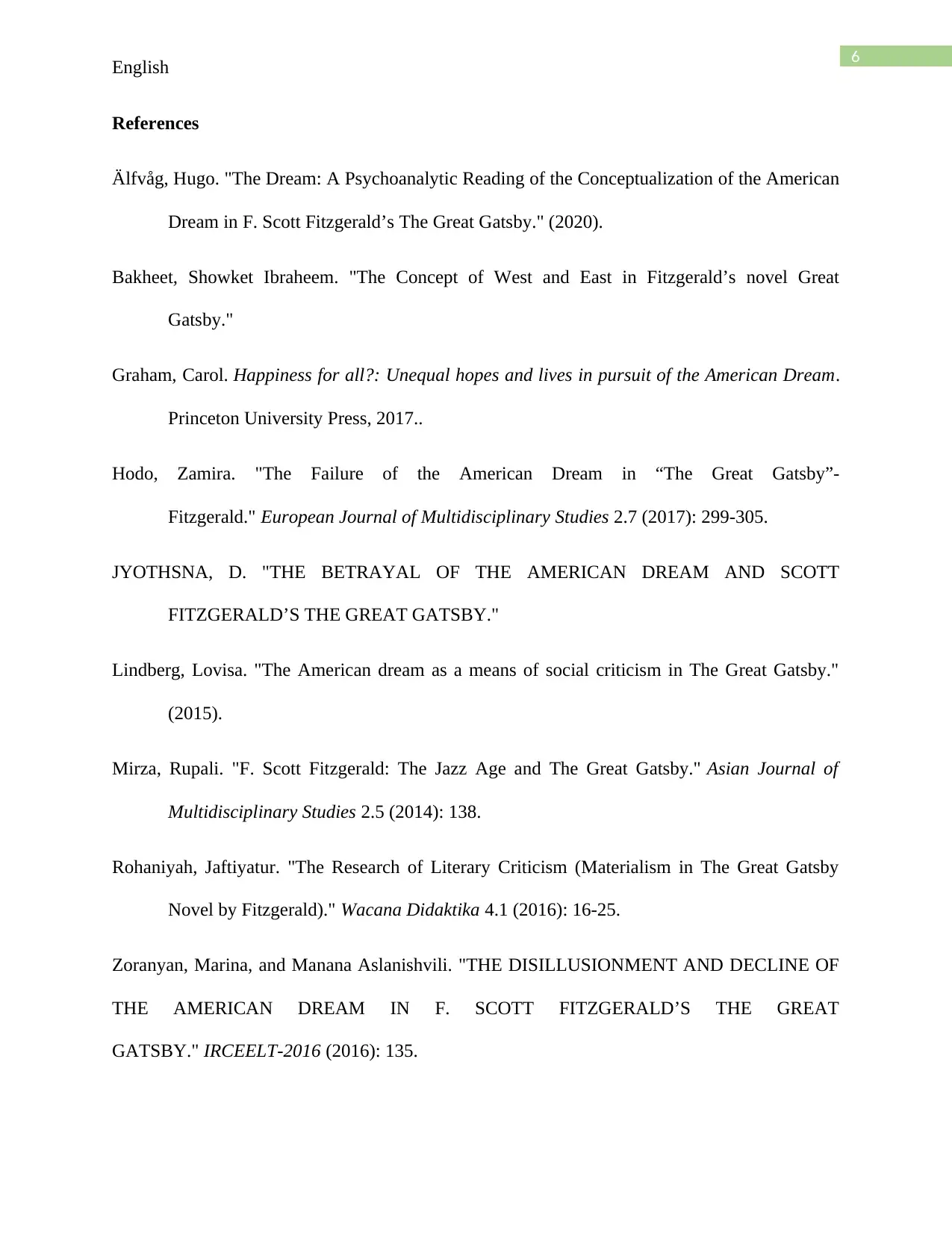
6
English
References
Älfvåg, Hugo. "The Dream: A Psychoanalytic Reading of the Conceptualization of the American
Dream in F. Scott Fitzgerald’s The Great Gatsby." (2020).
Bakheet, Showket Ibraheem. "The Concept of West and East in Fitzgerald’s novel Great
Gatsby."
Graham, Carol. Happiness for all?: Unequal hopes and lives in pursuit of the American Dream.
Princeton University Press, 2017..
Hodo, Zamira. "The Failure of the American Dream in “The Great Gatsby”-
Fitzgerald." European Journal of Multidisciplinary Studies 2.7 (2017): 299-305.
JYOTHSNA, D. "THE BETRAYAL OF THE AMERICAN DREAM AND SCOTT
FITZGERALD’S THE GREAT GATSBY."
Lindberg, Lovisa. "The American dream as a means of social criticism in The Great Gatsby."
(2015).
Mirza, Rupali. "F. Scott Fitzgerald: The Jazz Age and The Great Gatsby." Asian Journal of
Multidisciplinary Studies 2.5 (2014): 138.
Rohaniyah, Jaftiyatur. "The Research of Literary Criticism (Materialism in The Great Gatsby
Novel by Fitzgerald)." Wacana Didaktika 4.1 (2016): 16-25.
Zoranyan, Marina, and Manana Aslanishvili. "THE DISILLUSIONMENT AND DECLINE OF
THE AMERICAN DREAM IN F. SCOTT FITZGERALD’S THE GREAT
GATSBY." IRCEELT-2016 (2016): 135.
English
References
Älfvåg, Hugo. "The Dream: A Psychoanalytic Reading of the Conceptualization of the American
Dream in F. Scott Fitzgerald’s The Great Gatsby." (2020).
Bakheet, Showket Ibraheem. "The Concept of West and East in Fitzgerald’s novel Great
Gatsby."
Graham, Carol. Happiness for all?: Unequal hopes and lives in pursuit of the American Dream.
Princeton University Press, 2017..
Hodo, Zamira. "The Failure of the American Dream in “The Great Gatsby”-
Fitzgerald." European Journal of Multidisciplinary Studies 2.7 (2017): 299-305.
JYOTHSNA, D. "THE BETRAYAL OF THE AMERICAN DREAM AND SCOTT
FITZGERALD’S THE GREAT GATSBY."
Lindberg, Lovisa. "The American dream as a means of social criticism in The Great Gatsby."
(2015).
Mirza, Rupali. "F. Scott Fitzgerald: The Jazz Age and The Great Gatsby." Asian Journal of
Multidisciplinary Studies 2.5 (2014): 138.
Rohaniyah, Jaftiyatur. "The Research of Literary Criticism (Materialism in The Great Gatsby
Novel by Fitzgerald)." Wacana Didaktika 4.1 (2016): 16-25.
Zoranyan, Marina, and Manana Aslanishvili. "THE DISILLUSIONMENT AND DECLINE OF
THE AMERICAN DREAM IN F. SCOTT FITZGERALD’S THE GREAT
GATSBY." IRCEELT-2016 (2016): 135.
1 out of 6
Related Documents
Your All-in-One AI-Powered Toolkit for Academic Success.
+13062052269
info@desklib.com
Available 24*7 on WhatsApp / Email
![[object Object]](/_next/static/media/star-bottom.7253800d.svg)
Unlock your academic potential
© 2024 | Zucol Services PVT LTD | All rights reserved.



